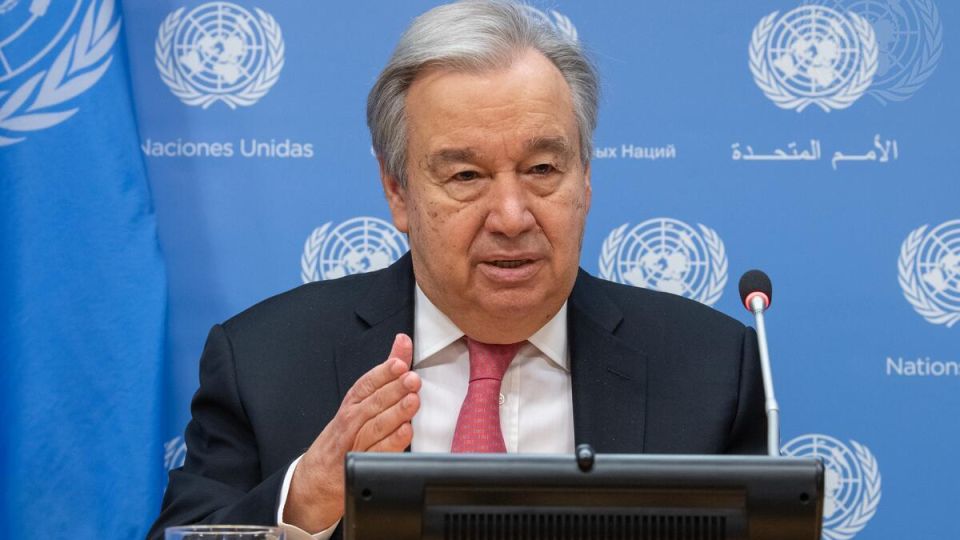February 3, 2022
SEOUL – UN Secretary-General Antonio Guterres on Tuesday denounced North Korea’s intermediate-range ballistic missile launch as a “breaking” of the country’s self-imposed moratorium on nuclear and long-range missile tests.
The statement came days after North Korea on Sunday fired the Hwasong-12 nuclear-capable missile, which was the first launch of the missile since September 2017.
The Hwasong-12 is the longest-range missile launched by Pyongyang in more than four years, after the test-firing of a Hwasong-15 intercontinental ballistic missile in November 2017.
Guterres condemned the missile launch and urged North Korea to “desist from taking any further counter-productive actions,” deputy spokesperson for the UN secretary-general, Farhan Haq, said in a written statement.
“This is a breaking of the DPRK’s announced moratorium in 2018 on launches of this nature, and a clear violation of Security Council resolutions,” Guterres was quoted as saying.
North Korean leader Kim Jong-un in 2018 announced that it would “discontinue nuclear test and inter-continental ballistic rocket test-fire from April 21.” Kim also pronounced that any kind of “nuclear test and intermediate-range and inter-continental ballistic rocket test-fire” were no longer needed.
South Korean President Moon Jae-in on Sunday said he viewed the Hwasong-12 launch as the act of “moving closer to renouncing the moratorium.” But the UN chief appeared to identify the intermediate-range ballistic missile launch as a de facto abrogation of North Korea’s self-imposed moratorium.
S. Korea-US-Japan trilateral coordination
North Korea conducted seven weapons tests in January alone, which include the firing of nine ballistic missiles in six discrete launches from Jan. 5 to 30.
In response, the Biden administration has maintained its two-pronged approach of seeking diplomatic solutions in trilateral coordination with key allies in the Indo-Pacific region and pressing ahead with different steps to call Pyongyang to account for its weapons tests.
Deputy Secretary of State Wendy Sherman on Tuesday discussed the latest missile launch with her South Korean and Japanese counterparts, Choi Jong-kun and Mori Takeo, State Department spokesperson Ned Price said in a press statement.
Choi, Sherman, and Mori “reaffirmed the importance of trilateral cooperation between the United States, the ROK, and Japan in tackling pressing challenges in the region and across the globe.”
Sherman “denounced the DPRK’s recent and escalatory ballistic missile launches as violations of UN Security Council resolutions and destabilizing to the region,” while reiterating the US’ commitment to diplomatic efforts.
“The Deputy Secretary highlighted the United States’ continued readiness to engage in serious and sustained diplomacy with the DPRK in order to make tangible progress,” Price said.
US Secretary of State Antony Blinken on the same day “condemned” North Korea’s recent ballistic missile launches and “committed to trilateral cooperation” towards the complete denuclearization of the Korean Peninsula in his phone conversation with Japanese Foreign Minister Hayashi Yoshimasa, Price announced in a separate statement.
Special Representative for North Korea Sung Kim also discussed Sunday’s missile launch during phone calls with his Japanese and South Korean counterparts, Funakoshi Takehir and Noh Kyu-duk, respectively, on Saturday and Sunday, the US State Department said Tuesday.
US requests Security Council consultations
Washington also called for the UN Security Council to have an emergency meeting this week on Pyongyang’s latest launch of the Hwasong-12 missile.
“We requested consultations for Thursday,” a spokesperson for the US mission to the UN told The Korea Herald on Wednesday, without confirming whether a meeting would be held behind closed doors.
Russia, which assumes a rotating presidency of the UNSC in February, would confirm the timing of the third Security Council consultations on North Korea’s missile launches.
But questions remain whether the Security Council’s 15 members will reach a consensus on joint action, including additional sanctions designation, against the intermediate-range ballistic missile launch.
In January, China and Russia placed a hold on the US’ request to blacklist five North Korean officials previously designated by the Treasury Department for procuring missile-applicable goods from the two countries.
A UNSC joint action appears to be a long shot. Russian Ambassador to the UN, Vassily Nebenzia, said Tuesday that Russia would convene a general meeting on adverse humanitarian socioeconomic impacts of UN sanctions and their “unintended consequences” on Feb. 7.
Nebenzia also said the draft resolution calling for easing sanctions on North Korea, which were circulated by China and Russia in late October last year, remains before the Security Council. The agenda topic will be discussed at the upcoming debate.
“Our … humanitarian resolution is on the table. We discussed it with our colleagues in the council. Some of them consider that it is not yet timely,” Nebenzia said during a news conference. “North Korea is one on the list, which is obviously subject to (discussion) at our meeting on Feb. 7.”


